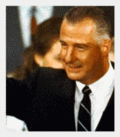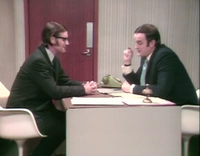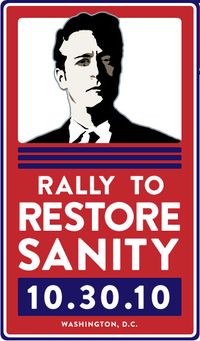Think of this as Volume 14, Number 39 of A-Clue.com, the online newsletter I've written since 1997. Enjoy.
| The Daily Show With Jon Stewart | Mon – Thurs 11p / 10c | |||
| Rally to Restore Sanity | ||||
|
||||
A key point in the development of any political thesis comes when people are called out explicitly to support it.
That's what is happening on the Mall this October 30. It may be the most important political event of the year, putting the politics of our time on trial and calling for its rejection.
The President hasn't done this. A comedian has. And to the nattering classes it sounds crazy. Only, in the context of our time, crazy is the only truth. When everyone else is afraid to speak truth to power it becomes the job of the jester.
To the President's supporters it's baffling. Because as Obama made clear in his recent CNBC appearance, which drew such negative reviews from the nattering classes, he's not raging at his enemies and, thus, not putting "a human face" on the ideals they marched for, or the continuing struggle to put them into practice.
Well, I happen to have watched the CNBC appearance. All of it. What I saw were hard questions from frightened people of means, and a calm man at the center discussing choices that had to be made, and those which still have to be made.
He treated the people who asked the questions, and who watched on TV, like grownups. There was no shouting. There was a limited range of emotion, because emotion is not helpful. He was Yoda, not Luke. He was Miyagi, not the Karate Kid. He was Eastern, not Western. (It's his Indonesianness, not his Kenyanness, that is the key to his character.)
More important, there was no call to hate and he issued no call to fear. He gave his critics credit for good intentions. Yet the dehumanizing of critics is so embedded in the Nixon Thesis of Conflict that we can't conceive of politics being any other way.

Agnew gave us the hippies, the media, the academics, the tumult of the 60s and those he claimed enabled it. In response the left responded with Nixon, making him a figure of their fear and loathing.
Yet that thesis was validated. Jimmy Carter was an accidental President who, while wise and far ahead of his time, never adapted to the new way of politics, and was easily dismissed by knees jerking to personal demonization.
So it has gone. Reagan had Communists and liberals. We hated them. Bush had black criminals, the parole system, and Saddam Hussein. We hated them. Clinton was immediately made a figure of hate through a torrent of lies spread by the right-wing, and we hated him. Gore was also personalized, caricatured, dehumanized, and dismissed by the right.
They didn't engage in debate. They engaged in war.
It wasn't until the rise of the Netroots in 2002 that the left truly got this message. And so responded in kind. Hatred spewed from every pore for Bush and his team, who responded through their media the same way. The result was brain-dead policy, based on generation-old assumptions (tax cuts always work, war is the only answer to fear) that didn't even ask the right questions for the new era.
Obama was not elected by the Netroots. He took what Dean had started and scaled it, turning the Internet into a political machine devoted to an inchoate cause. When Oprah Winfrey called him "the one" the right dismissed her, forgetting this was in fact Nixon's own campaign slogan in 1968.
But what did he really believe in? Observers bred on the Nixon Thesis, the Clinton Anti-Thesis, or Netroots Defiance have asked that continuously for 20 months now.
Their answer was fully on display in the CNBC show. The Obama Thesis of Consensus is based on the idea of engaging with anyone who comes to the argument with reason and goodwill. It's not left, it's not right, it's not even center. It's less about the what of politics than the how.

An argument isn't just contradiction. Yet that's just what it has become. There is no real debate, just people talking past one another. The point isn't to come to an agreement, but to "win" — the way you do on a battlefield, not in a courtroom.
Obama doesn't give his supporters what they crave. He doesn't try to personally vilify John Boehner, or Mitch McConnell, or Newt Gingrich, or even Christine O'Donnell. The worst he does is laugh as he might at a correspondent's dinner. His most personal statement was that he was being treated "like a dog" by his opponents, by which he didn't mean a pampered suburban pet but an urban cur from the Honolulu street. (Naturally, those who hate him twisted the remark into something unrecognizable.)
It was a statement of fact that many saw as blood in the water. You're not supposed to tell the truth. You're not supposed to let your guard down. When faced with something nasty, you lie, loudly, you accuse the other side of causing all the trouble, you act — in short — like a pit bull in a ring. It's not just that they treat him like a dog, but they expect him to react like one.

On the surface, this is completely non-political, a joke. That's what Crossfire thought and notice what happened to Tucker Carlson's TV career.
It's set up as a joke, but there's a serious point at the heart of it. That serious point is the core of the Obama Thesis of Consensus.
You might call Jon Stewart the Bizarro Agnew. He's playing the same role.
Anyone who is willing to talk and not shout, to listen and dialogue, can have a role in solving our political problems. Civilization is the price you pay for entrance into a civilized society. So act civilized.
This is the same challenge faced by our greatest leaders, by FDR and by Lincoln. Like this President, FDR faced foes on his left and his right who questioned whether civilized democracy and capitalism could, or should survive, given the pit of despair which the world had fallen into. Lincoln faced both an intractable enemy and allies who wanted nothing more than the destruction of their countrymen, and his speeches were devoted not just to framing the war but to seeking unity after it. "We are not enemies, but friends. We must not be enemies." That's from his First Inaugural, given before the shooting started.
What democracy demands for its survival is that we listen to the better angels of our nature. You can win an election by destroying those you perceive to be enemies, but the great experiment of the Founders demands more of us.
It demands mutual respect.
Already, the comic has drawn more commitments to his little affair, three days before the next election, than the Crazy drew a month ago. It's masked by a corresponding rally on behalf of cohort Stephen Colbert, but Colbert's cause is so obviously insane it actually buttresses what Stewart is trying to do.
He's calling a new generation to renew the work before us, reasonably, honorably, purposefully, sanely, quietly, which is all the President is asking of us as well, and what our history demands of us:
The mystic chords of memory, stretching from every battlefield and patriot grave to every living heart and hearthstone all over this broad land, will yet swell the chorus of the Union, when again touched, as surely they will be, by the better angels of our nature.
Can the Crazy stand when the Silent Majority commit to sanity? In the long run, the answer has to be no.









